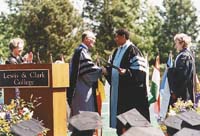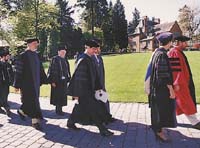Class of 2000: Stewards of a new century
Open gallery


Historians are already remaking the old century, if not the past thousand years. On one account, it was an age of blessed novelty, of new technologies and social arrangements that first created, then spread, vast new wealth through large areas of the globe. It was an age that improved health, lengthened life and extended education. It emancipated women and, through the growth of efficient markets, turned beggars into producers and commoners into leaders. Its greatest generation—that of mid-century—put life on hold to vanquish evil abroad, then came home (those who survived) to become educated, to raise families and, piece by patient piece, to build the economy that won the Cold War as well.
A rival version of the century is less triumphant. It begins with the blood of our century; much of the blood was spilled in the defense of liberty, but much was spent foolishly on vain ambitions or cruel tyrants. It nods to the chemistry that has improved crop yield and to the biology that has conquered disease, but it points with alarm to our lethal and silent springs and to the addictive comforts that imperil our planet. Above all else, it exposes the glare of vast and growing inequities between the privileged few and the struggling many, and it traces their origin to the twin gilded ages that began and ended our century.
If your life in the liberal arts has taught you anything, it is surely to beware of one-dimensional views of complex realities. In courses from physics to art, you have been compelled to ask questions with precision, to sift evidence with patience, to test results and conclusions, then to start the process anew. Knowledge, you have found, is empowering but humbling. For every issue settled, two more spring up to be probed.
How paradoxical then is the outcome? If you depart this place, confident that your hold on truth is fixed and absolute, we have failed you. If, on the other hand, you feel you now know less about yourself and your universe than you did four years ago, your career with us has been a success.
As of today, you become the stewards of a new century. Whether you see the one behind you (that of your elders) as an achievement or a challenge, bring to your tasks the same skills you have learned during your days at this College. Think globally and critically, judge carefully and tolerantly, and act with passion and compassion alike, knowing well that the consequences of your actions are never quite what you intend.
And when the cheers of this day have subsided and you have settled, easily or after struggle, into the next stage of your career, think back on this College and the faculty who have helped form your minds and your spirits.
Rejoice in the broad and generous education you have received. Apply yourselves to building lives that are rewarding to and supportive of all who share this universe. And, above all, remember the Alma Mater that has trained you and that cherishes you.
Godspeed!
President Michael Mooney
Presented at the 128th annual Commencement of Lewis & Clark’s College of Arts and Sciences, April 30, 2000

More L&C Magazine Stories
Lewis & Clark Magazine is located in McAfee on the Undergraduate Campus.
MSC: 19
email magazine@lclark.edu
voice 503-768-7970
fax 503-768-7969
The L&C Magazine staff welcomes letters and emails from readers about topics covered in the magazine. Correspondence must include your name and location and may be edited.
Lewis & Clark Magazine
Lewis & Clark
615 S. Palatine Hill Road MSC 19
Portland OR 97219

